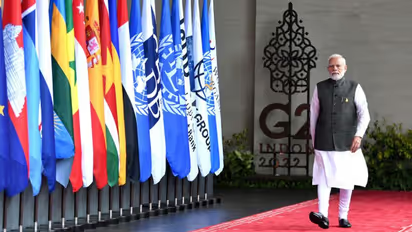G20 Summit: India gains at global stage, but so does PM Modi

Synopsis
While the Indian government has used the G20 summit to project the country's culture and capabilities to the world and also to strengthen its diplomatic relations and influence, it has also been a clear strategy to reap political gains within the country, says Ambassador Venu Rajamony
Delhi is welcoming world leaders for the G20 Summit on September 9-10. The 18th G20 Heads of State and Government Summit in Delhi will witness a gathering of leaders and representatives of 19 countries and the European Union. Among those attending are United States President Joe Biden, British Prime Minister Rishi Sunak, Canadian PM Justin Trudeau, Japanese PM Fumio Kishida, and Saudi Arabian King Salman bin Abdulaziz Al Saud.
Leaders of nine countries, including the Prime Minister of Bangladesh and the King of the United Arab Emirates, have also been invited as guests. Missing, however, will be two key leaders -- President Vladimir Putin of Russia and President Xi Jinping of China.
The G20 was formed in 1999 in the backdrop of the financial crisis of the late 1990s. The G20 members represent around 85 per cent of the global GDP, over 75 per cent of global trade, and about two-thirds of the world population. Primarily a forum for international economic cooperation, it plays an important role in shaping and strengthening global architecture and governance on all major international economic issues.
India was invited to be a member of the G20 during the tenure of Prime Minister Manmohan Singh. Hosting of summits is an honour and responsibility given to every member country. The G20 Presidency rotates annually among the members and is responsible for bringing together the G20 agenda, organising its meetings and hosting summits.
The last summit was in Indonesia and next summit will be in Brazil, followed by South Africa. In fact, India’s turn was last year but the government chose to exchange its turn with Indonesia, keeping in mind the 2024 Parliamentary elections.
India described its priorities for the Summit as inclusive and resilient growth; progress on SDGs; green development and LiFE (Lifestyle for Environment Initiative); technological transformation and public digital infrastructure; reforming multilateral institutions; women-led development; and international peace and harmony.
A G20 Leaders’ Declaration will be adopted on the second day of the Summit, which will reflect the priorities and commitments discussed in the various ministerial and working group meetings throughout the year.
India has positioned itself as the voice of the Global South holding discussions with developing countries in the run-up to the Summit. It has also invited the African Union to become a permanent member of the G20. These are commendable initiatives. Any multilateral exercise in which leading countries of the world come together to deliberate on issues and arrive at collective decisions, especially one in which India is a member should be welcomed.
Such efforts contrast the resort to unilateral decisions and actions by powerful countries. However, there is criticism that the G20 has been reduced to a talk shop for the financial crisis and the unity of action that the world community demonstrated at the time of the crisis has never been reproduced.
Similarly, it has been pointed out that the Summit cannot just ignore major political challenges the world confronts. For example, the Russia-Ukraine war. Ukraine was keen to be invited to the Summit and associated meetings. It wanted the Delhi Summit to be a forum where leading countries, especially India, mediate with Russia to end the war.
Because of Russia’s objections to any reference to the war, meetings held in the run-up to the Summit could not result in consensus documents. The fate of the Summit declaration remains to be seen. In fact, India’s biggest challenge over the last year has been preventing the Russia-Ukraine conflict from overwhelming and derailing the Summit.
Similarly, the publication of standard maps by China showing territories disputed with India as part of its territory on the eve of the Summit also highlights the limitations of a diplomatic extravaganza like the G20 in helping address critical foreign policy challenges that India confronts.
In conclusion, the G20 Summit has been fully used by the Indian government to project India, its diversity, culture and capabilities to the world. The Summit will indeed spread greater knowledge about India. It will also help strengthen India’s diplomatic relations and influence, especially with African countries and non-member countries invited as guests.
The Summit has provided India with an opportunity to shape the global agenda on issues of development and growth as well as strengthen coordination on key economic and financial issues. India has utilized this opportunity well using all resources at its command.
However, underlying the flurry of G20 activities has also been a clear strategy to reap political gains within the country by positioning Prime Minister Narendra Modi as a world statesman responsible for India’s rise as a global power.
The author was the former Ambassador of India to the Netherlands, former Permanent Representative to the Organization for Prohibition of Chemical Weapons, former Press Secretary to the President of India and former Consul General of India in Dubai. He is also an Officer on Special Duty (External Cooperation) with the Government of Kerala and a professor of Diplomatic Practice at the Jindal Global Law School.
Stay updated with the Breaking News Today and Latest News from across India and around the world. Get real-time updates, in-depth analysis, and comprehensive coverage of India News, World News, Indian Defence News, Kerala News, and Karnataka News. From politics to current affairs, follow every major story as it unfolds. Get real-time updates from IMD on major cities weather forecasts, including Rain alerts, Cyclone warnings, and temperature trends. Download the Asianet News Official App from the Android Play Store and iPhone App Store for accurate and timely news updates anytime, anywhere.